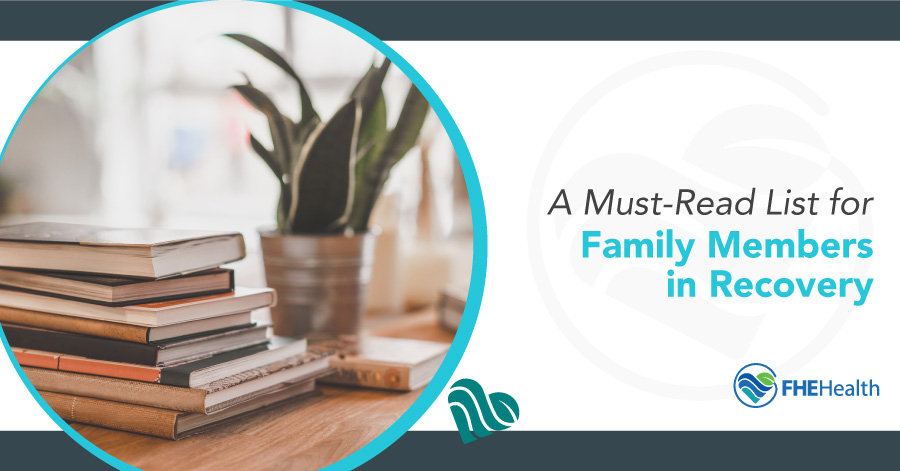
Navigating the addiction of a loved one is never easy, particularly for those new to the process of substance abuse and recovery. It’s not uncommon to feel unsure of how to help, especially when tough situations like relapse occur. Parents may blame themselves, friends may pull away and family members may say the wrong things at the wrong times. Unfortunately, there’s rarely an easy answer to addiction, and that includes how to support an addict best.
For those who want to stand by their friends and loved ones, education can make a difference. With a little more guidance, family members can learn how to be supportive without being enabling. The right resources can facilitate a safe, healthy approach to recovery in a way that’s both supportive and compassionate.
Books for family members of addicts can be a great place to start. These tools can offer firsthand accounts of what addiction is like and provide positive coping techniques. In addition, they can help outline how to best give support without enabling addiction. From memoirs to self-help guides, there are plenty of books to learn from.
Substance abuse touches roughly half of all American families, indicating a significant problem in need of proper resources. These books about addiction and family can offer insight, education, and experience. They can help loved ones provide the best possible support system for those with substance use disorders.
Why Don’t They Just Quit? by Joe Herzanek
Joe Herzanek’s Why Don’t They Just Quit? answers one of the most fundamental questions many family members ask in the face of substance abuse.
From the outside looking in, quitting drugs or alcohol seems like a simple case of willpower. This leads many family members of addicted individuals to ask, “Why don’t they just quit?” However, the truth is more complex than that. Addiction can be both physical and psychological. Herzanek explores how an addicted mind works, how to provide support without enabling, and steps to help those in need. In addition, the book answers many questions parents and loved ones might have. These questions cover topics such as faith in AA, how to have an intervention, and distinguishing between addiction and heavy use.
With endorsements from experts in the recovery field, Why Don’t They Just Quit? provides a wealth of information for those navigating addiction.
Addict in the Family: Support Through Loss, Hope and Recovery by Beverly Conyers
Addict in the Family: Support Through Loss, Hope and Recovery by Beverly Conyers is an introspective look at the role addiction plays within a family. Written by an addiction specialist with a daughter addicted to heroin, this book is a kind and compassionate road map for handling addiction.
As Conyers puts it, “For almost every addict who’s mired in this terrible disease, others — a mother or father, a child or spouse, an aunt or uncles or grandparents, a brother or sister — are suffering too. Families are the hidden victims of addiction, enduring enormous levels of stress and pain.”
Her books for parents of drug addicts and other key family members help these individuals work through challenging moments. This is especially beneficial for those in the earliest, and most problematic, stages of recovery.
Don’t Let Your Kids Kill You: A Guide for Parents of Drug and Alcohol Addicted Children by Charles Rubin
One of the best available books for loved ones of addicts, Chris Rubin’s Don’t Let Your Kids Kill You is written specifically for parents. This is unlike other books that may provide advice for friends or extended family as well as mothers and fathers. For parents seeking answers, Rubin’s guide can offer unique advice tailored for child-rearing.
Many parents feel their lives are over when their child gets involved with drugs or alcohol. Others may believe they must give up their own well-being to address their child’s problems. Rubin aims to help parents prioritize their own self-care while still doing what’s best for their children. He also promotes cutting ties when needed, even if that means withdrawing financial or emotional support. As he puts it in the introduction, “The one thing you do know is that you wouldn’t volunteer to go through it again, even with all the awareness you’ve gained. You would never have sacrificed your child just so that you could become a better, stronger person. But this is the way it has turned out.” This guide promotes acceptance and forward-thinking, not blame and shame.
Beautiful Boy: A Father’s Journey Through His Son’s Addiction by David Sheff
David Sheff’s powerful and touching book, Beautiful Boy: A Father’s Journey Through His Son’s Addiction, is a memoir rather than an informational guide or instruction manual. Described by novelist Anne Lamott as “a brilliant, harrowing, heartbreaking, fascinating story,” this book is now a major motion picture starring Steve Carell due to its cultural relevance. While reading, parents and family members relive the story of Sheff’s son’s addiction.
As this book about addiction and family states, “Anyone who has lived through it, or those who are now living through it, knows that caring about an addict is as complex and fraught and debilitating as addiction itself.” Some have described Beautiful Boy as uncomfortable to read, particularly for those who can identify with Sheff’s struggles. However, the overwhelmingly positive response demonstrates just how challenging it is to navigate addiction as a parent.
Addiction is never easy to face, and all the books in the world won’t make a painful situation hurt less. However, these books for family members of addicts offer perspectives that can make supporting recovery easier. The right books can go a long way in teaching friends, family members, and loved ones how to approach rehabilitation.
If someone you love is living with a substance use disorder and needs help with recovery, FHE Health can help. Contact us today to learn more about our comprehensive step-down addiction treatment programs.






